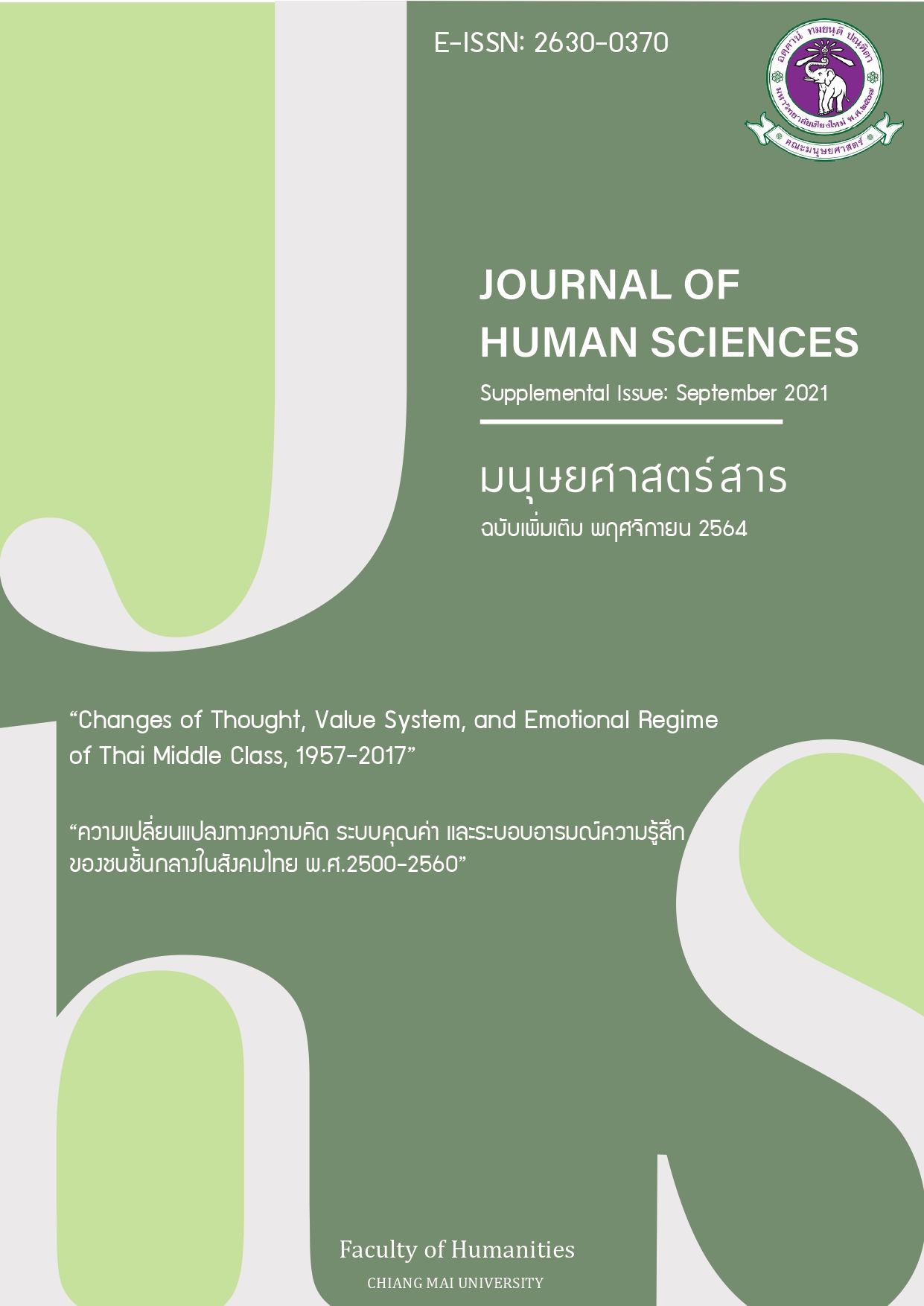ความรักและวิถีทางกามารมณ์ของชนชั้นกลางไทย พ.ศ.2540-2560
Main Article Content
บทคัดย่อ
บทความนี้นำเสนอเรื่องความรักและวิถีทางกามารมณ์ของชนชั้นกลางไทย ในช่วง พ.ศ.2540-2560 ผ่านกรอบประวัติศาสตร์ความรู้สึกที่ประยุกต์ใช้ในการวิจัย โดยมีวัตถุประสงค์หลัก เพื่อศึกษาความเปลี่ยนแปลงของระบบคุณค่าและอารมณ์ความรู้สึกเกี่ยวกับความรักและวิถีทางกามารมณ์ของชนชั้นกลางกลุ่มใหม่ที่เริ่มเข้าสู่วัยผู้ใหญ่ ดำเนินชีวิตอยู่บนเงื่อนไขทางสังคม เศรษฐกิจ และการเมืองแบบใหม่ โดยศึกษาผ่านหลักฐานที่เกี่ยวกับพฤติกรรมการเสพย์สื่อบันเทิงทางด้านกามารมณ์ ประเภทละครทีวี แอปพลิเคชั่นหาคู่ ภาษาและสัญญะในโซเชียลมีเดีย เช่น ธุรกิจสอนรัก รายการวิทยุ เรื่องเล่าและประสบการณ์ของผู้คนชนชั้นกลางผ่านชุมชนทางโซเชียลมีเดีย เพื่อที่จะได้เข้าใจความเปลี่ยนแปลงของปรากฏการณ์ความรักและกามารมณ์ที่ปรากฏอยู่ในสังคมได้อย่างเท่าทัน
บทความชิ้นนี้แบ่งการนำเสนอออกเป็น 2 ส่วน ส่วนแรก มุ่งทำให้เห็นวิถีทางกามารมณ์ภายใต้กรอบศีลธรรมกระแสหลักของชนชั้นกลาง โดยนำข้อมูลจากงานวิจัยอื่นๆ ที่เกี่ยวข้องมาสังเคราะห์ เพื่อสร้างคำอธิบายใหม่ที่ฉายให้เห็นภาพความเปลี่ยนแปลง ส่วนที่สองของบทความมุ่งนำเสนอให้เห็นผ่านหลักฐานและยกตัวอย่างกรณีศึกษาที่เป็นรูปธรรม เพื่อสะท้อนให้เห็นถึงระบอบคุณค่าในวิถีทางกามารมณ์ของชนชั้นกลางใหม่ การมองเห็นความเปลี่ยนแปลงของ ความรักและวิถีทางกามารมณ์ของชนชั้นกลางกลุ่มใหม่ จะช่วยทำให้เข้าใจมิติในเชิงวัฒนธรรมของมนุษย์และสังคมที่สัมพันธ์กันอย่างซับซ้อน อันจะทำให้เราที่เป็นส่วนหนึ่งของสังคมมีความเข้าใจและมองเห็นทางเลือกของชีวิตและสังคมมากขึ้น
Article Details
เอกสารอ้างอิง
Arphonsuwan, T. (2007). khon chan klang nai wannakam Thai, nai nasini tanthuwanit (bannathikan), sưksa ruchak wiphak khon chan klang ram botkhwam chak kansammana thang wichakan khana sangkhomwitthaya læ manutsayawitthaya mahawitthayalai Thammasat [Middle Class in Thai Literature, in Nasinee Tanthuwanit (Editor), Study and criticize the middle-class Ram about articles from academic seminars Faculty of Sociology and Anthropology, Thammasat University] Bangkok: MisterKopy.
Bunkajorn, T. (1978). phatthanakan nawaniyai Thai Pho.So. songphansiroichetsipha - songphanharoi [The development of Thai novels, 1932-1957]. Bangkok: Chulalongkorn University.
Burnett, R. & Dabid P. M. (2003). Web theory. London: Routledge.
Chaiwaraporn, A. (1997). nang Thai kap kan sathon phap sangkhom[Thai movies and social reflections]. Sarakadee Magazine, 13(150). 125-129.
Cuadry, W. (2019). di che phio aya læ Club Friday raikan thi tham nathi dulæ huachai sangkhom ma talot sipsi pi [DJ Pee Aoi and ‘Club Friday’, a program that has beentaking care of the heart of society for 14 years]. Retrieved from https://www.gqthailand.com/views/article/p-aoy-club-Friday
Dongthong, S. (2016). Natyim: Samphanthaphap thangphetsamphan bæpchuakhrao khongkedoi Chaithawittœ [Twitter Hook Up: Dating for Men Who Have sex with men].Seminar in Sociology and Anthropology 2 on April 1, 2561, Thammasat University.
Eoseewong, N. (2002). waduai phet khwamkhit Tuaton læ akhatithangphet Phuying Ke Phetsưksa lækaman ["gender", identity and gender prejudices, sex education]. Bangkok: Matichon.
Giddens, A. (1992). The Transformation of Intimacy: Sexuality, Love and Eroticism in Modern Societies. Polity Press
Hamilton, A. (1992). Family dramas: film and modernity in Thailand. Screen, 33(3).
Holland, D. C., & Eisenhart, M. A. (1990). Educated in romance: Women, achievement, and college culture. Chicago: University of Chicago Press.
Jeffries, F. L., & Hunte, T. L. ( 2003). Generation and motivation: A connection worth making. Journal of behavioral and applies management, 6(10). 37-70.
Khamphaka. (2016). sư lok kao vs sư lok mai [old world media vs new world media]. Retrieved from https://www.matichonweekly.com/column/article_2304
Kirsch, A. (1975). Economy, Polity and Religion. In G. W. Skinner and A. T. Kirsch (eds.), Change and Persistence in Thai Society, (pp.172-196). NY: Cornell University Press.
Laungaramsri, P. (2011). rakromæntik nai mummong sangkhomwitthaya læ manutsayawitthaya [Romantic love in a sociological and anthropological perspective] Journal of Social Sciences, Chiang Mai University, 23(1). 17-50.
Manatpiyalert, S. (2005) Mianoi: Krabuankan tatsinchai læ kanpraptua [Minor Wife: Process of Decision Making And Adjustment] Bangkok: Thammasat University. Retrieved from http://digital.library.tu.ac.th/tu_dc/frontend/Info/item/dc:113838
Mektrairat, N. (2010). kan patiwat Sayam Pho.So. songphansiroichetsipha [The Siamese Revolution of 1932]. Bangkok: sameskybooks.
Nimmanorawong, P. (2014). Paritasprawatsatarrom [Review of emotional history]. Retrieved from https://so05.tci-thaijo.org/index.php/thammasat_history/article/view/78384
phariya sut [Good Wife Course in Buddhism]. Retrieved from https://84000.org/tipitaka/attha/v.php?B=23&A=1977&Z=2035
Phongphaičhit, B. & Baker, C. (2014). Prawatsatthairuamsamai [Contemporary Thai history]. Bangkok: Matichon.
Polsilp, N. (2018). dao po dao yua chut khai khong nang Thai thi mai khœi hang hai pai nai [Porn stars, Temptresses, selling points of Thai movies that never disappeared]. Retrieved from https://www.gqthailand.com/culture/article/erotic-actress-thai-film
Rapeepat, A. (1984). sangkhom Thai nai samai ton krung Rattanakosin Pho.So. songphansamroiyisipha - 2416. plæ doi Mo.Ro.Wo. prakai thong siri suk læ Punnee chatphonrak. [Thai society in the early Rattanakosin period, 1782-1873. Translated by Prakaithong Sirisuk and Pannee Chatpolrak]. Bangkok: The Foundation for the Promotion of Social Sciences and Humanities Texbooks Projects.
Reddy, W. (2001). The Navigation of Feelings: A Framework for the History of Emotions. Cambridge: Cambridge University Press.
Reddy, W. (2012). The Making of Romantic Love: Longing and Sexuality in Europe, South Asia, and Japan, 900-1200 CE. Chicago: University of Chicago Press.
Sattayanurak, A. (1995). kan plianplæng lokkathat khong chon chan phun Thai tangtæ ratchakan thi si - Pho.So. songphansiroichetsipha [Changing the worldview of the Thai leadership class Since the reign of King Rama IV -1932]. Bangkok: Chulalongkorn University,
Satyanusakkul, W. (2016). Ying ChuA Nai PrawattisaT Thai: KaNsaNg KhwaMpen Ying DoI Chon Channam SayaM ChuAng Ton RattanakoSin - Pho.So. SoNgphansiRoIcHetsipcHet ["Harlots" In Thai History: A Construction of Femininity by The Siamese Elite, Early Bangkok Period - 1934]. (Master Of Arts Thesis, Thammasat University).
Songsamphan, C. (2008). prawattisat khong phet withi: prawattisat rưang phet/rưang phetnai prawattisat Thai [History of sexuality: the history of sex /sexuality in Thai history]. Bangkok: Women's Health Advocacy Foundation.
Suklapkit, S. (2013). phuadiaomiadiao Naisangkhomthaisamaimai 2410-2480 [Monogamy In Modern Thai Society, 1870s-1940s]. Bangkok: Chulalongkorn University.
The new Era of Sex by Trainer Nalisa. Retrieved from https://www.schoolandcollegelistings.com/XX/Unknown/106921230737153/The-New-Era-of-Sex-by-Trainer-Nalisa
Warathon, S. (1976). prawattikan praphan nawaniyai [novel writing history]. Bangkok: The Foundation for the Promotion of Social Sciences and Humanities Texbooks Projects.
wichan Sanan sammana panhua hai phua long kæ panha rưang bon tiang [Review of seminars make husband fall in love Help solve the problem of sex]. Retrieved from https://www.dailynews.co.th/regional/582963?fbclid=IwAR3kNe3cbyCRQz4L5Cgwq_VNA78EwhT-1Qsj8Iri3Er-EF0l3S8zG7lP5v0


